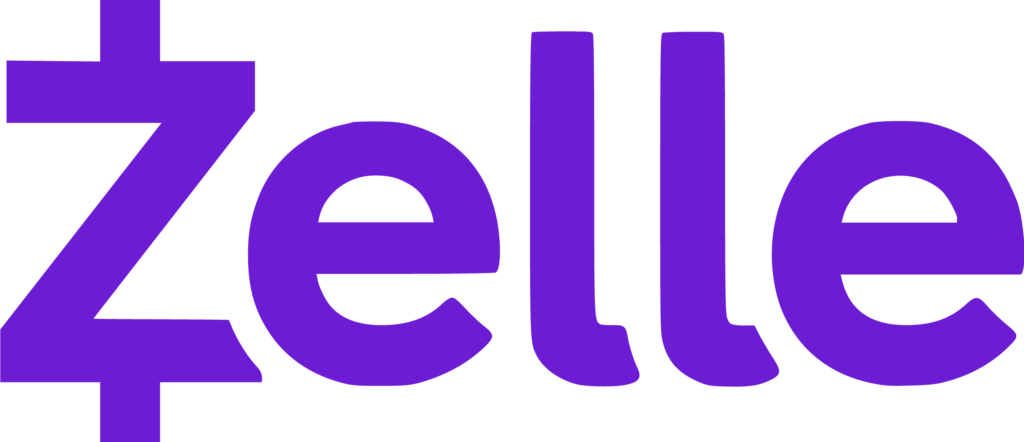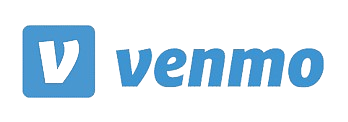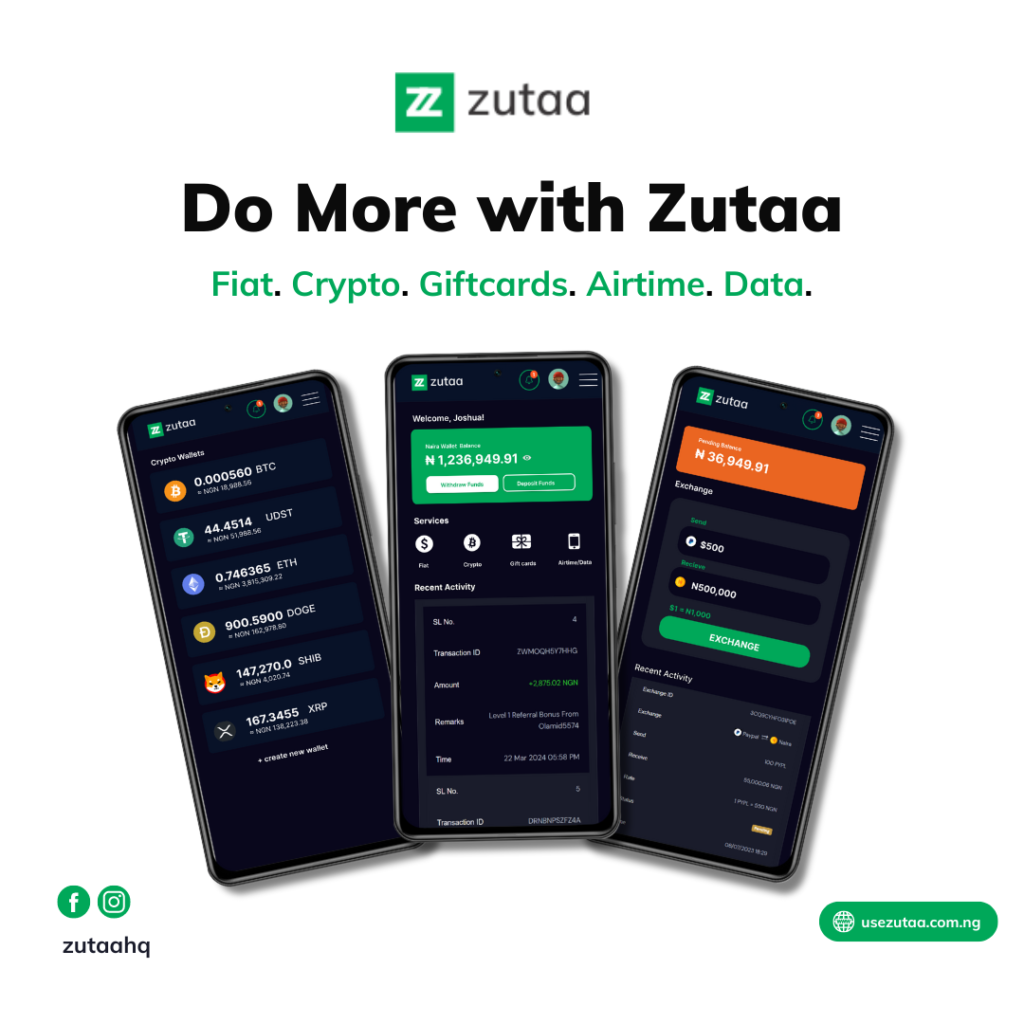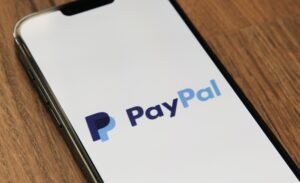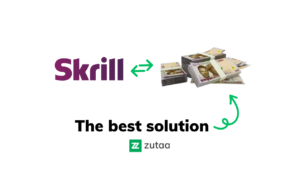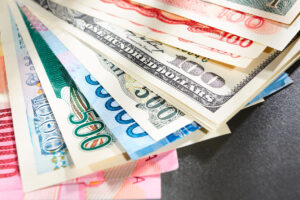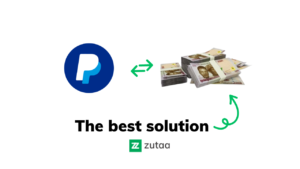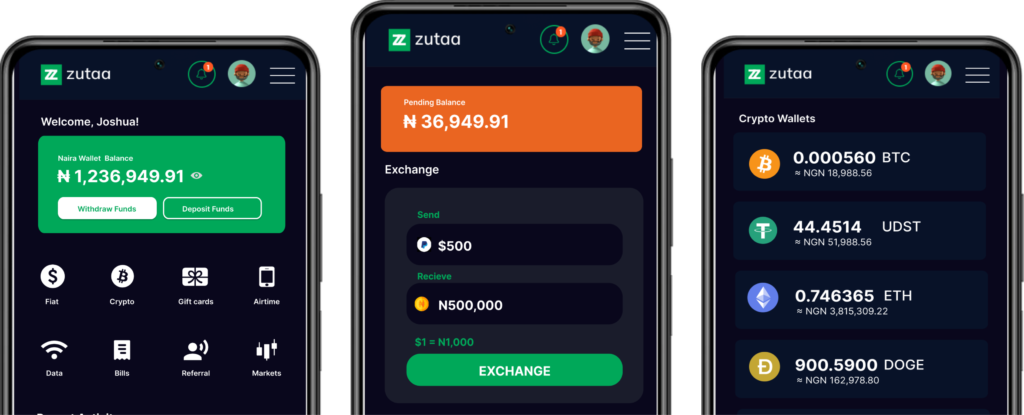Table of Contents
ToggleIntroduction:
PayPal Holdings, Inc. is an American multinational financial technology company operating an online payments system in the majority of countries that support online money transfers; it serves as an electronic alternative to traditional paper methods such as checks and money orders. The company operates as a payment processor for online vendors, auction sites and many other commercial users, for which it charges a fee
it is a payment platform with a website and a phone app that enables payments between parties through online money transfers. PayPal customers create an account and connect it to a checking account, a credit card, or both Once identification and proof of funds are confirmed, users can send or receive payments online or in a store using PayPal as the go-between. Millions of small and large retailers, online and in the real world, accept PayPal payments.
Established in 1998 as Confinity,PayPal went public through an IPO in 2002. It became a wholly owned subsidiary of eBay later that year, valued at $1.5 billion. In 2015 eBay spun offPayPal to its shareholders, and PayPal became an independent company again.The company of the largest United States corporations by revenue.
How Does PayPal Work?
PayPal offers payment services for consumers and for merchants who accept Paypal. Merchants use a PayPal card reader in brick-and-mortar stores or enable Paypal as a payment option on their websites. Consumers can pay invoices and transfer money with relative ease. Cash can be transferred to any email address or phone number, whether or not the recipient has a PayPal account. Users need an email address to sign up for an account and must provide a credit card, debit card, or bank account to complete the setup. 3 PayPal verifies the information to make sure the person setting up the account is the rightful owner before the service can be used.
Service rendered
PayPal’s services allow people to make financial transactions online by granting the ability to transfer funds electronically between individuals and businesses.Through PayPal, users can send or receive payments for online auctions on websites like eBay, purchase or sell goods and services, or donate money or receive donations. It is not necessary to have a PayPal account to use the company’s services. PayPal account users can set currency conversion option in account settings.
The PayPal app is available online or at the iTunes App Store and Google Play. One year after acquiring Braintree, PayPal introduced its “One Touch” service, which allows users to pay with a one-touch option on participating merchants websites or apps.
In 2007, PayPal acquired the online credit product Bill Me Later, Inc. which has since been rebranded as PayPal Credit and provided services for Comenity Capital Bank, the lender of PayPal Credit accounts. Founded in 2000, Bill Me Later is headquartered in Timonium, Maryland. PayPal Credit offers shoppers access to an instant online revolving line of credit at thousands of vendors that accept PayPal, subject to credit approval. PayPal Credit allows consumers to shop online in much the same way as they would with a traditional credit card. The rebranding of Bill Me Later as PayPal Credit also means that consumers can use PayPal Credit to fund transactions virtually anywhere PayPal is accepted. In 2015 PayPal agreed that PayPal Credit would pay a $25 million fine to settle a complaint filed in Federal Court by the Consumer Financial Protection Bureau.
From 2009 to 2016, PayPal operated Student Accounts, allowing parents to set up a student account, transfer money into it, and obtain a debit card for student use. The program provided tools to teach how to spend money wisely and take responsibility for actions. PayPal discontinued Student Accounts in August 2016.
In November 2009, PayPal partially opened its platform, allowing other services to get access to more APIs and to use its infrastructure in order to enable peer-to-peer online transactions.
On November 28, 2011, PayPal reported Black Friday brought record mobile engagement, including a 538% increase in global mobile payment volume when compared with Black Friday 2010.
In 2012, the company launched “PayPal Here”, a small business mobile payment system that includes a combination of a free mobile app and a small card-reader that plugs into a smart phone.
PayPal launched an updated app for iOS and Android in 2013 that expanded its mobile app capabilities by allowing users to search for local shops and restaurants that accept PayPal payments, order ahead at participating venues, and access their PayPal Credit accounts (formerly known as Bill Me Later).
On October 21, 2020, PayPal announced a new service allowing customers to use cryptocurrencies to shop at 26 million merchants on the network starting in 2021. Paypal has been using Paxos Trust to provide the back end infrastructure allowing users to manage and trade cryptocurrencies in accordance to data privacy rules and financial regulations. Paxos has been in charge of acquiring the necessary regulatory approvals for Paypal to facilitate cryptocurrency assets. As part of the announcement, PayPal secured the first conditional cryptocurrency license from the New York State Department of Financial Services, which will allow customers to purchase cryptocurrencies such as Bitcoin, Litecoin, Ethereum, and Bitcoin Cash.
In March 2022, PayPal introduced a flat-fee structure for cryptocurrency transactions under $200; transactions over $200 incur a 1.8% fee for purchases or sales up to $1,000, and 1.5% for any transaction amount greater than $1,000.
As of 2022, PayPal operates in 202 markets and has 426 million active, registered accounts. PayPal allows customers to send, receive, and hold funds in 25 currencies worldwide.
Founders of PayPal
In 2023, there were 433 million PayPal users, and 20 billion payments had gone through the platform. For many, it’s the ideal payment platform, and small businesses have come to rely on it. Still, if you go back to its origins, the execution was anything but perfect. It all goes back to the late 90s. Back then, tech entrepreneurs Peter Thiel, Max Levchin, and Luke Nosek wanted to dive into digital payments. We must remember that, back then, e-commerce was just beginning. The few businesses venturing into online payments had nothing close to a decent platform to work on. So, Thiel, Levchin, and Nosek took it upon themselves to solve this, and that’s how Confinity was born. At first, the three tried many ideas, including a Palm Pilot to Palm Pilot IOU system, which sounded awful, and performed just as poorly. Fortunately for them, times were moving very fast. In months, Confinity had gone through several projects and learned enough to land on a payment system called PayPal that would allow users to transfer money digitally.
Transferring money online with little hassle was the key to success, and by creating a platform where it could be done integrally, the PayPal idea gained strength. At the same time, Confinity made a crucial step. In March 2000, Confinity merged with an online bank called X.com and took the latter’s name. The founder of X.com was none other than Elon Musk. In April of that year, the controversial South African took over as CEO, with Thiel becoming Chairman of the Board. Musk’s tenure as a CEO was as long (or as short) as a summer love. By October 2000, he stepped down as a CEO, and Thiel took over, with Musk remaining on the Board, but that’s not to say his presence didn’t have a direct impact. If Musk’s leadership has come under fire as of late, with his handling of Twitter, it seems like a reflection of the past.
As the CEO of X.com, Musk was biased and favored his side of the company instead of the overall idea of Confinity. Heads butted, and it got to a point in which a figurative cout de etat occurred, one of the most dramatic in Silicon Valley history, according to author Ashlee Vance: A small group of X.com employees gathered one night at Fanny & Alexander, a now-defunct bar in Palo Alto, and brainstormed about how to push out Musk. They decided to sell the Board on the idea of Thiel returning as CEO.
Instead of confronting Musk directly with this plan, the conspirators decided to take action behind Musk’s back. After a successful betrayal (depending on who you ask), the company assigned Peter Thiel as CEO and, in no time, ditched the X.com moniker. Thus, it became known as PayPal in 2001 and was an immediate success. That same year, the company amounted to 10.2 million users. By February 2002, four years after the initial idea and just months after renaming itself as PayPal, the company successfully went public, going from $13 to a closing value of $20. While the startup was enjoying impressive numbers, behind closed doors, money was scarce. Its chaotic upbringing meant there was little control, but fortune had it; they would have a stroke of luck. In July of that year, eBay announced it would buy PayPal for $1.5 Billion, finalizing the acquisition by October. Everyone who had been a part of the company walked out a millionaire. It’s a fascinating, fast-paced story that doesn’t end with eBay purchasing the struggling startup. In fact, this is just the beginning of the PayPal Mafia, and it all starts with the Don, Peter Thiel, and the loyal Consigliere, Levchin.
PayPal is one of the top Fintech Companies worldwide, with a market cap of $84.81 billion. The platform revolutionized the way of money transactions back in 1998. PayPal was quickly adopted by people across the globe, crossing the benchmark of 100 million users in 2006. Currently, the platform has 431 million active users. Let’s take a look at PayPal’s insights and trends in this post.
Paypal Statistics:
- 431 million people use PayPal globally as of 2023.
- PayPal holds 40.52% of the global market share of the payment service segment.
- PayPal generated a revenue of $7.28 billion in the 2nd quarter of 2023.
- 6.07 billion PayPal payment transactions were processed in the second quarter of 2023.
- The Total Payment Volume of PayPal was $376.54 billion in the 2nd quarter of 2023.
- PayPal recorded 53.1 transactions per account on average in the 2nd quarter of 2023.
- There are 29 million merchant accounts on PayPal in 2023.
- The current workforce at PayPal stands at 29,900 employees.
- More than 200 countries and regions accept PayPal
PayPal Fees
PayPal makes much of its revenue from fees it charges merchants, rather than from the consumers who pay with it.There is no fee for using PayPal to pay for a transaction if you use a PayPal balance or your linked bank account and the payment is in your home currency. There is no fee if you send cash to a friend or relative rather than a business, again in your home currency. There’s no fee for transferring money to and from PayPal and your bank account.
Other transactions incur fees:
* There’s a 4% currency conversion fee for most transactions that involve conversion.8
* A PayPal transaction that uses your linked credit card incurs a fee of 2,9% plus a fixed fee that varies by country. It is 0.30 cents in the U.S.3
The trick here is to make sure your PayPal account defaults to your checking account, not to your credit card. The PayPal-branded credit and debit cards have their own fee structures, which seem fairly typical for the industry. Other fees apply to less routine transactions such as buying and selling cryptocurrencies and sending charitable donations.
PAYPAL OFFICES
PayPal’s corporate headquarters are located in the North San Jose Innovation District of San Jose, California, at North First Street campus.
The company’s operations center is located in La Vista, Nebraska, which was opened in 1999. Since July 2007, PayPal has operated across the European Union as a Luxembourg-based bank. The PayPal European headquarters are located in Luxembourg and the international headquarters are in Singapore.
PayPal opened a technology center in Scottsdale, Arizona in 2006, and a software development center in Chennai, India in 2007. In October 2007, PayPal opened a data service office on the north side of Austin, Texas, and also opened a second operations center in La Vista, Nebraska that same year.
In 2011, joining similar customer support operations located in Berlin, Germany; Chandler, Arizona; Dublin and Dundalk, Ireland; Omaha, Nebraska; and Shanghai, China; PayPal opened a second customer support center in Kuala Lumpur, Malaysia, and began the hiring process.
In 2014, PayPal opened a new global center of operations in Kuala Lumpur.
Paypal Security
In early 2006, PayPal introduced an optional security key as an additional precaution against fraud. A user account tied to a security key has a modified login process. Account-holders enter their login ID and password as normal, but are then prompted to enter a six-digit code provided by a credit card sized hardware security key or a text message sent to the account holder’s mobile phone. For convenience, users may append the code generated by the hardware key to their password in the login screen. This way they are not prompted for it on another page. This method is required for some services, such as when using PayPal through the eBay application on iPhone.
This two-factor authentication is intended to make it difficult for an account to be compromised by a malicious third party without access to the physical security key, although it does not prevent the so-called Man in the Browser (MITB) attacks. However, the user (or malicious third party) can alternatively authenticate by providing the credit card or bank account number listed on their account. Thus, the PayPal implementation does not offer the security of true two-factor authentication.
How PayPal has helped the Nigerian economy
In the last few years, Nigeria has been going through a lot of economic turmoil. The country is plagued by corruption and mismanagement. It also suffers from a lack of basic resources including electricity and water. Despite these challenges, Nigeria is still a hub for entrepreneurship and innovation. The Nigerian economy relies heavily on the use of cash as a means of payment. This makes it difficult for people to purchase goods and services from online stores. Which are not as common in Nigeria as they are in the Western world. Therefore, PayPal has been able to bridge this gap by providing businesses in Nigeria with an alternative means of payment that only requires an internet connection or mobile phone.
PayPal offers Nigerian citizens an easy way to transfer money from one account to another. In addition to making payments for goods and services across borders, it also provides Nigerian businesses with access to international markets. Enabling them to grow their companies internationally and expand into new markets.
Reasons why PayPal is perfect for businesses in Nigeria
* Global reach: PayPal is available in over 200 markets around the world. So it’s a perfect option for Nigerian businesses who want to expand their customer base globally.
* Global acceptance: PayPal has over 377 million active users worldwide. Which means that it has the largest reach among all other payment options in Nigeria.
* Flexibility: PayPal offers flexible payment options. This means that you can pay with your local currency or in your country’s currency, depending on what you prefer.
* Convenience: PayPal also offers a variety of tools that can help them manage their business like invoicing, online payments, and more.
How Much Does PayPal Charge for Exchange?
When you send and Receive Money for Goods and Services, popularly known as PayPal business account, the PayPal fees is 2.99%. And if Standard Credit and Debit Card Payments 2.99% + fixed fee.
Does Paypal Charges Change?
Yes, the PayPal exchange rate changes, because the PayPal Foreign Transaction Fee exchange is about 2.5%, and when you send Money to friends or family with eligible PayPal accounts outside the U.S. using your Balance Account balance, the fee charge 5% (minimum $0.99 fee; maximum $4.99 fee).
Are you searching for a reliable and secure method to sell your PayPal funds in Nigeria? Look no further! In this comprehensive guide, we will walk you through the process of selling your PayPal funds in Nigeria safely and securely. We understand the concerns about scams and fraudulent activities, so we have selected a trusted exchanger, Zutaa, that ensures a smooth and hassle free transaction process.
How do I convert my money to another currency in PayPal?
Method 1: To convert money to another currency:
1. Go to Payment Methods.
2. Select the More icon beside the currency you want to convert and click Convert currency. 3. Select a currency (Naira) and enter the amount you want to convert. Our conversion rate will be displayed on this page. Click Next.
4. Click Convert Now.
METHOD 2( using PayPal app)
Open the PayPal app on your Android, iPhone, or iPad. It’s the icon of a white “P” on a blue background. You’ll find the app on your Home screen, in the app list, or by searching. This will take you to your PayPal Dashboard.
* If you’re not signed in to PayPal, follow the on-screen instructions to access your account.
* If you want to send your balance to another person’s bank account instead of your own, that person will need to sign up for PayPal and then link their bank account. You can then send the money to them using the free “Friends and Family” option, and they’ll be able to transfer the balance to their account easily. Tap Transfer beneath your PayPal balance. You’ll see your balance on the left side of the screen.
Enter the amount you want to transfer. You can enter your entire available balance if you’d like, or you can transfer less to keep a balance in PayPal. The transfer amount must be at least $1.
Choose whether to make a Standard or Instant transfer.
You’ll see two tiles below your transfer amount—in minutes (Instant) and in 1-3 days.
* In minutes transfers your funds to your bank account instantly for a small fee. The fee amount appears on the tile.
* 1-3 days is a completely free standard bank transfer that takes a slightly longer to hit your bank account. Transfers made after 7PM on weekends and holidays might take a little longer.
* Some banks might charge additional fees or take more time to complete the transfer. In general, most major banks won’t have these fees and due process the transfer within 1 to 3 business days without problems.
Select your bank account.
If the correct bank account is not already selected, tap Change and select it now. * If you don’t see the bank you want to transfer to, you’ll need to link it to PayPal before you can withdraw your funds.
Tap the Transfer (amount) Now button.
You’ll see it at the bottom of the screen. This transfers your funds to the selected bank account.
METHOD 3: (using the website )
IF you’re not already signed in to your account, go ahead and sign in now. * If you want to send your balance to another person’s bank account instead of your own, that person will need to sign up for PayPal and then link their bank account. You can then send the money to them using the free “Friends and Family” option, and they’ll be able to transfer the balance to their account easily.
PayPal Money to Local Exchangers
Another way to send money from PayPal to Naira is to transfer directly from your PayPal balance or from your customers to a Local Nigerian Exchanger of your choice. Again, you will have to use their low PayPal to Naira exchange rate. When the money is processed based on agreement and abiding by their terms and conditions, the local exchanger will deposit the equivalent amount to your Naira account using their preferred exchange rate.
Pros of Sending PayPal Money to Local Exchangers
* You get paid in Naira.
* You can talk to customer support should you get hooked on the way.
* Payment can be fast – if no issue arises.
Cons of Sending PayPal Money to Local Exchangers
* Scammers are on the rise.
* Not all local exchangers can process PayPal to Naira payments.
* The PayPal Dollar to Naira exchange rate might be ridiculously low.
* Payment can take from 1 to 7 days or more depending on some circumstances surrounding the payment process.
* It takes time to identify a good and trusted exchanger with a track record.
BEST & Fastest Method: Exchange PayPal to Naira INSTANTLY using zutaa
Since 2020, zutaa has been helping Nigerians Exchange paypal to Naira with peace of mind, at the best possible market rate, and it all started with a Bad experience, our founder was Scammed by a Popular Youtuber who poses like an exchange vendor to rip unsuspecting people of their hard earned money, zutaa was founed out of necessity to make sure things Like that don’t happen to nobody ever again.
Between 2020 -2024 Zutaa helped Nigerians Exchange over $250,000 Paypal to Naira successfully at the best market rates, with 200+ customers who trust zutaa In Nigeria.
zutaa is on a Roadmap to Becoming Africa’s #1 Digital currency Exchange solution, and you know No.1 can’t happen without and lot of good reviews, ~check out our reviews~ just to let you know how serious zutaa is about it’s mission
Why Choose Zutaa for Selling PayPal Funds:

How to Sell PayPal Funds in Nigeria Safely:
Follow these step-by-step instructions to sell your PayPal funds securely using Zutaa:
Step 1: Create an account on Zutaa:

Visit the Zutaa website at [ https://usezutaa.com.ng/ ] and create an account by clicking on the Signup button. Fill in the required details, including your name, password, email, country, and phone number.
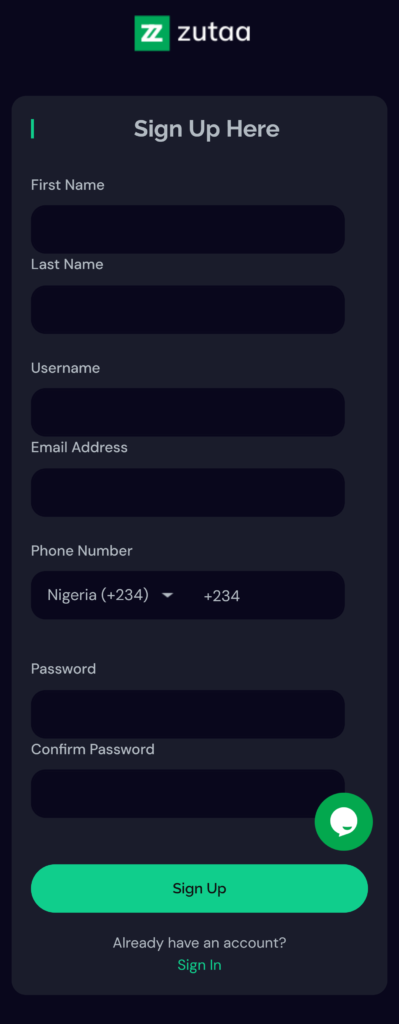
Step 2: Initiate a New Exchange:

After creating an account, log in to Zutaa and use the exchange box on your dashboard below your balance. Select PayPal from the list of digital currencies.
Step 3: Enter the PayPal Amount:
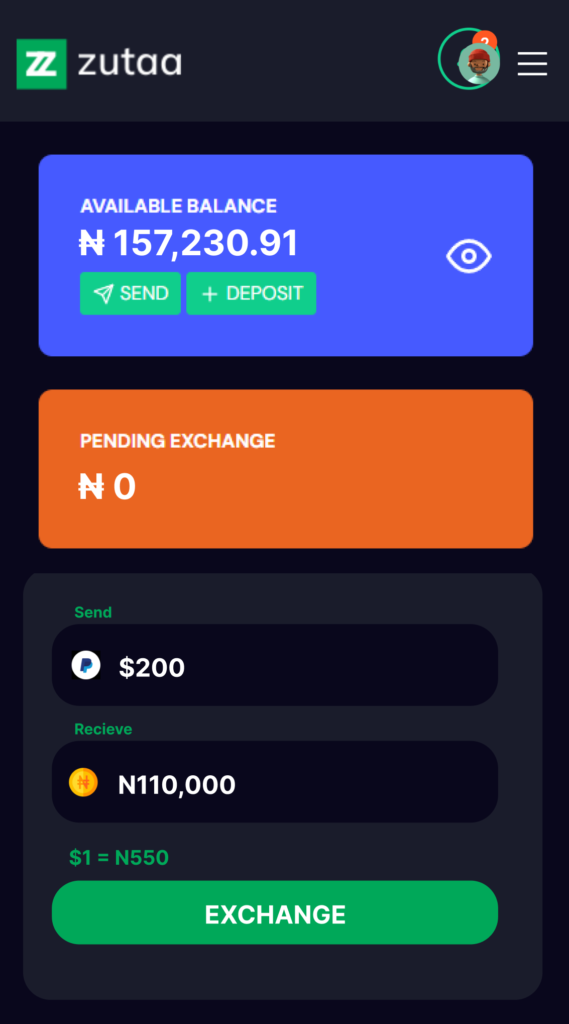
Specify the amount of PayPal funds you wish to sell in exchange for Naira. Zutaa has a minimum and maximum limit, so ensure your amount falls within the specified range. If you have a lower amount, contact Zutaa’s customer support for assistance.

Step 4: Send Amount to provided account, adhere to all instructions:
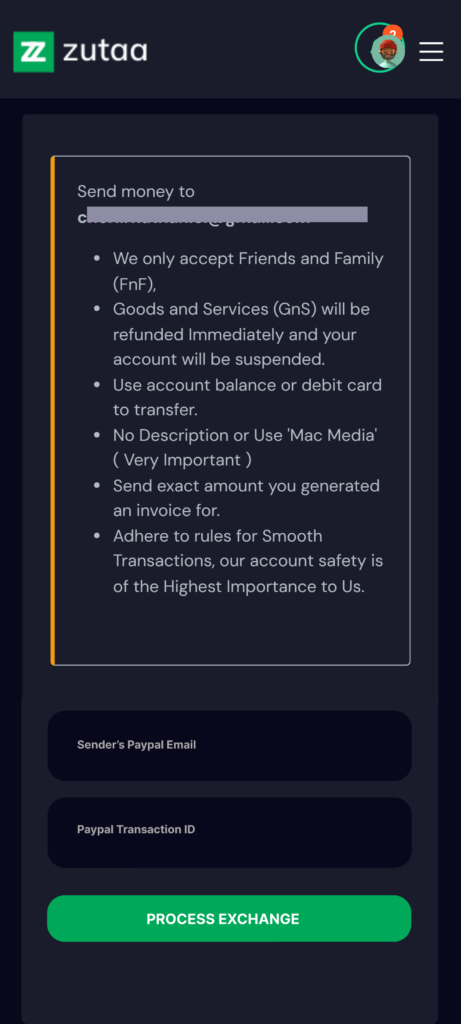
After sending, Enter the Sender’s Paypal Email, and Paypal transaction ID, Double-check the accuracy of the provided information before proceeding.
Step 5: Confirm the Transaction details:
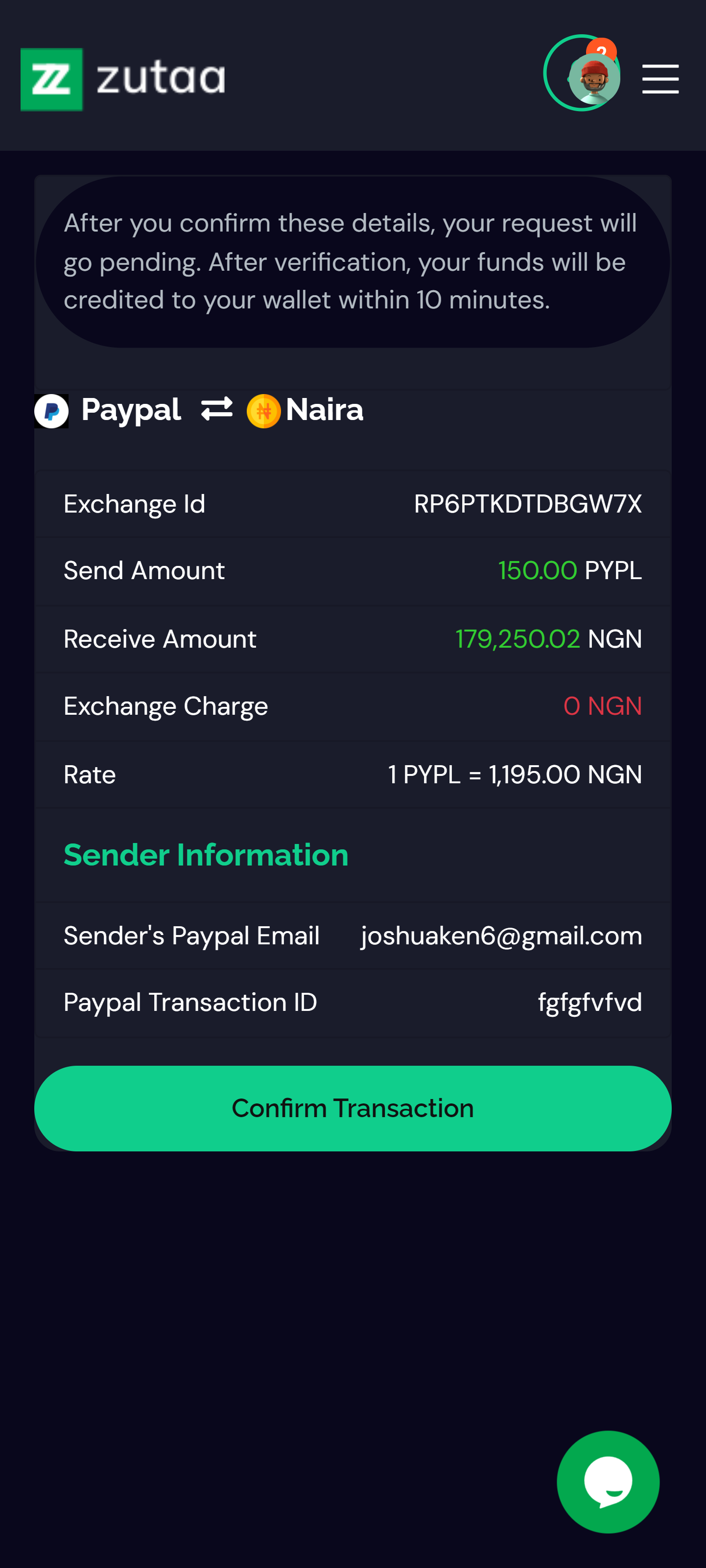
After confirming the transaction details, the initiated exchange will go to pending balance.
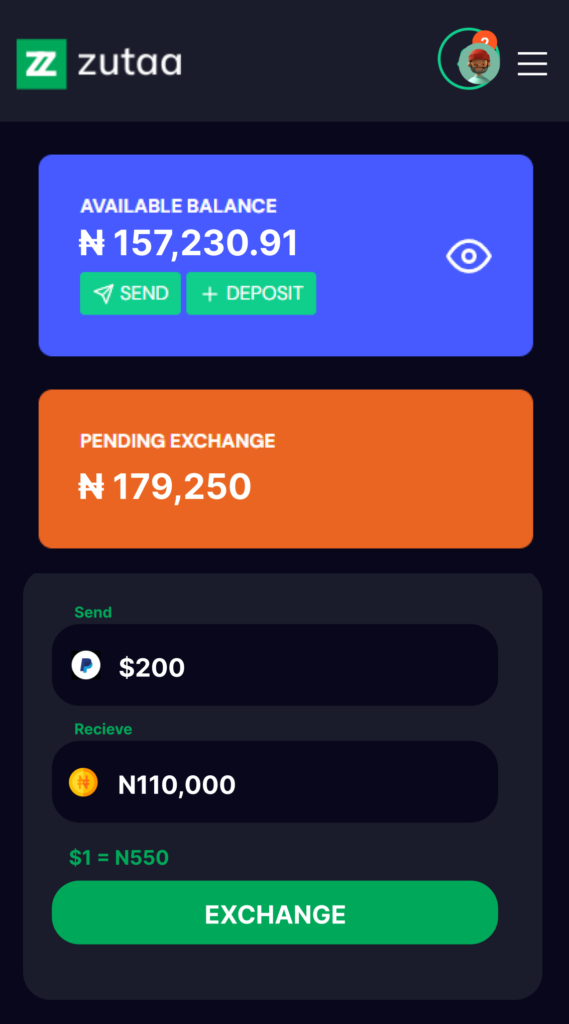

Step 6: Withdraw to your local bank account:
After your Exchange has been confirmed your naira wallet will be credited. You can now send Naira to your local bank account by clicking the send button.

click Payout to proceed
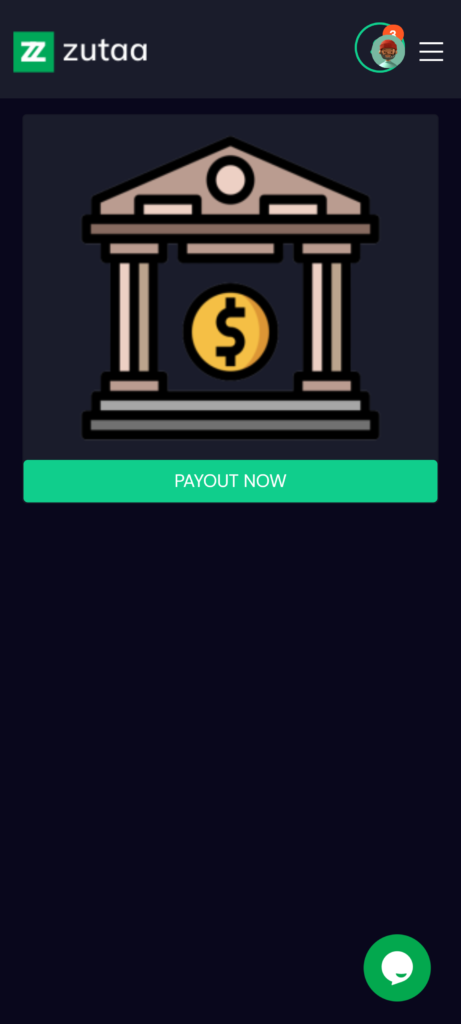
Input amount and confirm your details
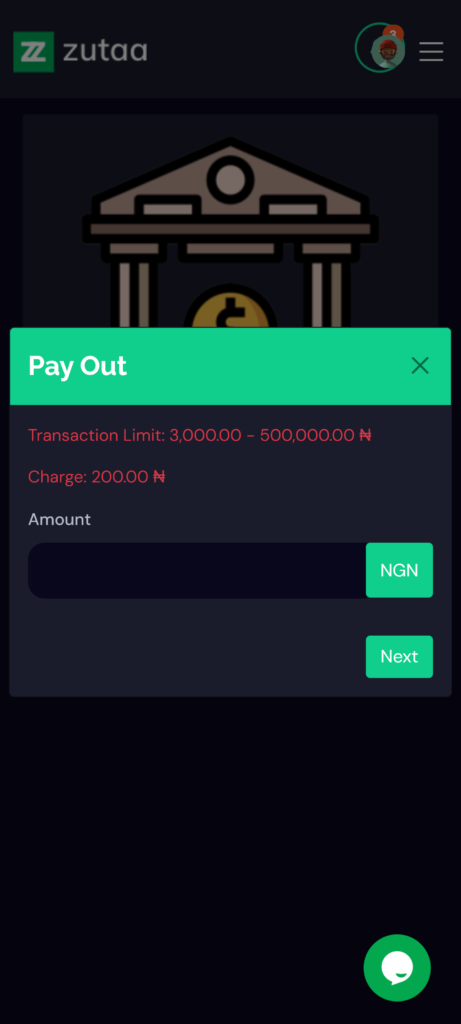
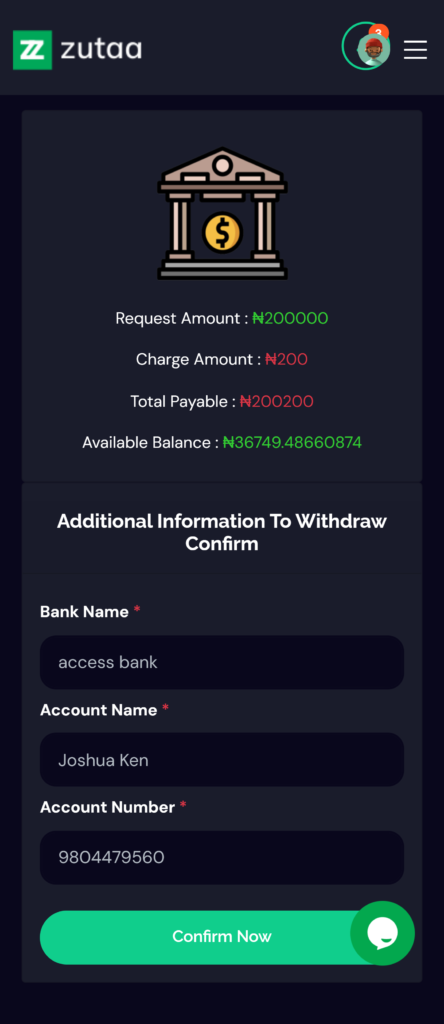
After confirming your details, your money should be in your account shortly.
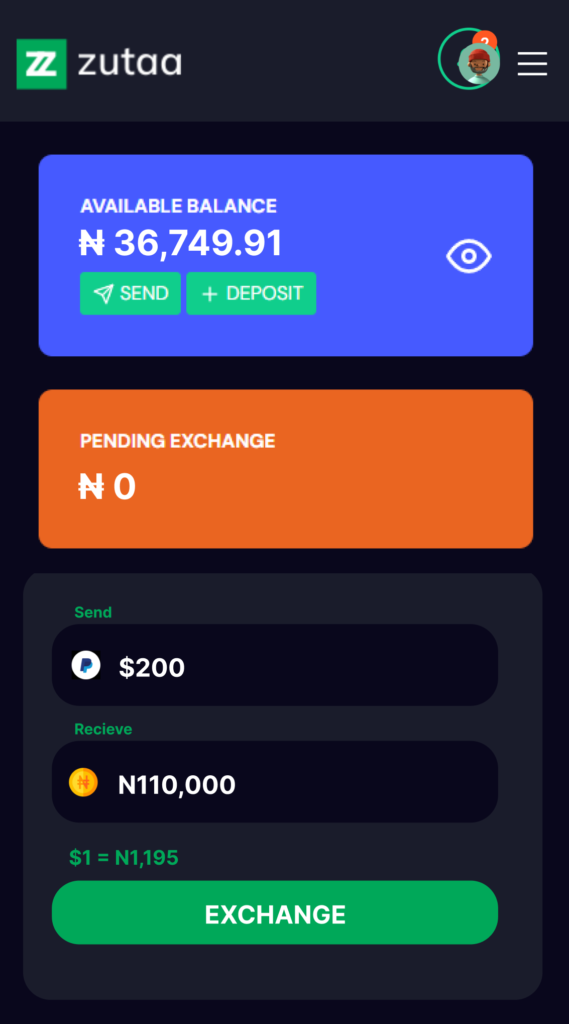
Paypal dollar to naira rate today
The paypal dollar to naira rate today is subject to fluctuations, but it is estimated to range between 450/$ to 800/$ depending on Exchanger and volume. Please note that exchange rates can change rapidly due to market dynamics and external factors, so it’s advisable to check with reliable sources for the most up-to-date information. See our current rates.
How Much is $100 PayPal in Naira Today?
$100 PayPal to Naira with a third party local exchangers is between ₦45,000 and ₦65,000. with zutaa you can get upto ₦80,000
How Much Does PayPal Charge for Exchange Rate in Nigeria?
When you send and Receive Money for Goods and Services, popularly known as PayPal business account, the PayPal exchange rate naira to dollar is 2.99%. And if Standard Credit and Debit Card Payments 2.99% + fixed fee.
Does Paypal Exchange Rate Change?
Yes, the PayPal exchange rate changes, because the PayPal Foreign Transaction Fee exchange is about 2.5%, and when you send Money to friends or family with eligible PayPal accounts outside the U.S. using your Balance Account balance, the fee charge 5% (minimum $0.99 fee; maximum $4.99 fee).
How Much is $1,000 PayPal to Naira?
$1000 PayPal to Naira with a third party local exchangers is between ₦1,000,000 and ₦1,050,000. with zutaa you can get upto ₦1,150,000
How Much is $500 PayPal in Naira?
$500 PayPal to Naira with a third party local exchangers is between ₦450,000 and ₦500,000. with zutaa you can get upto ₦550,000
How Much is $200 PayPal in Naira Today?
$200 PayPal to Naira with a third party local exchangers is between ₦180,000 and ₦200,000. with zutaa you can get upto ₦220,000
How Much is $1 PayPal in Naira?
$1 PayPal to Naira with a third party local exchangers is between ₦950 and ₦1,000. with zutaa you can get upto ₦1,100
Can you withdraw money from PayPal in Nigeria?
No, you can’t withdraw your PayPal funds directly to your Nigeria bank account
Can I receive PayPal in Nigeria?
Yes, you can. Not only can you receive PayPal in Nigeria you can also withdraw the funds directly to your bank account
Does PayPal work in Nigeria?
Yes, PayPal works in Nigeria, however, by default, you can only send out payments and not receive with your Nigerian account.
How do I withdraw money from PayPal to Nigeria’s bank account?
You can’t. by default, you can only send out payments and not receive with your Nigerian account.
Is PayPal a Good Choice for a Small Business in Nigeria?
No, but it’s Inevitable as PayPal is the largest digital payment infastructure with over 400Million customers wordwide and most prefered payment for clients around the world because of ease.
Its disadvantages include the current vendor delima where you can easily be scammed.
Conclusion
In conclusion, PayPal has evolved from its inception in 1998 as Confinity to becoming one of the leading fintech companies globally, with 433 million users and 20 billion payments processed as of 2023. Its success lies in providing a convenient and secure platform for online transactions, bridging gaps in the global economy, and facilitating cross-border commerce.
PayPal’s impact extends beyond facilitating transactions; it has played a significant role in supporting the Nigerian economy by providing an alternative means of payment and fostering international business growth. The platform’s statistics, such as its 40.52% global market share and $7.28 billion revenue in Q2 2023, underscore its prominence in the digital payment segment.
However, PayPal is not without challenges, especially in Nigeria, where an account can only send but not receive money which make it difficult to receive money without a Money exchanger, and this raises the rate of potential scams.
to solve this problem Zutaa has emerged as a reliable and trustworthy solution for exchanging PayPal to Naira in Nigeria. Established in 2020 as a response to the founder’s unfortunate experience with scams in the exchange process, Zutaa has since played a crucial role in facilitating over $100,000 in successful PayPal to Naira transactions for more than 120 satisfied customers.
The platform’s commitment to providing peace of mind and the best market rates has positioned it as a key player in the digital currency exchange landscape. Zutaa’s dedication to transparency and customer satisfaction is evident in the positive reviews it has garnered, underscoring its mission to become Africa’s leading digital currency exchange solution.
As Zutaa continues on its roadmap to becoming the number one choice in the region, its success hinges on maintaining its reputation for reliability, security, and customer service. The platform’s role in facilitating seamless PayPal to Naira exchanges contributes to the broader financial ecosystem in Nigeria, offering users a trusted avenue to navigate the complexities of digital currency transactions.
